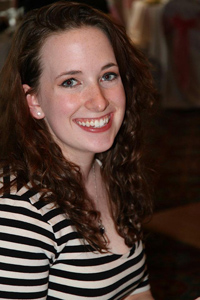
07/11/2012
Allison Best, a SUNY Cortland senior and a straight-A student for seemingly her entire life, racked up awards during her first two years of college that any parent would proudly display on the family mantel. With a grade point average that hovered around 4.0 and an undergraduate resume stuffed with extracurricular activities, Best had every reason to be content.
But she still sought something more impressive.
Growing up, the Victor, N.Y., native dreamed several big-picture aspirations related to event planning that never materialized. A self-described perfectionist, Best possessed the vision to mock up a thought-provoking academic lecture or stage a buzzing graduation party, but she lacked the execution.
“I feel like it’s like that for a lot of people,” the professional writing major said. “It’s easy to be like: ‘Wouldn’t that be a great idea? Yeah, it would. But I’ve got to get to my work that’s due tomorrow.’ And then it never happens.”
Oddly enough, it happened for Best in a big way this past spring when she organized two teach-ins on campus to generate discussion about the death penalty. In between her work as secretary of the Cortland Writers Association (CWA), editor-in-chief of CWA’s literary magazine The Cortland Writer and English peer tutor for the Educational Opportunity Program, she spearheaded an event that inspired similar discussions nationwide related to the death penalty.
Best’s work on the topic was several years in the making. As a teenager, she discovered the band State Radio and grew attached to the song “State of Georgia,” a tune that tells the controversial story of former death row inmate Troy Davis. Davis was executed in September 2011 for murdering a Georgia police officer, although recanted testimony from witnesses prompted several human rights groups, former politicians and celebrities to speak out for his innocence.
 |
| Allison Best |
“On the night of his execution, I was devastated,” said Best, who constantly presented on Davis’ case for class projects since she first heard about it. “I had no idea that I cared that much.”
She didn’t stop at making t-shirts or nudging her classmates to sign a petition. Lorraine Berry, Best’s professor at the time, took note of the student’s passion and the two organized a pair of teach-ins at the College. Titled “Life After Executions: Abolishing the Death Penalty in America,” the Feb. 28 and March 1 events pulled in roughly 50 people. The second one, which lasted for about three hours, generated positive back-and-forth discussion through a question-and-answer session.
More impressive, however, was the ripple effect Best’s work had across the country. During her exhaustive research process, which she said featured folders of information piled high and 20-hour weeks of reading in February, she reached out to Calling All Crows, an activist organization started by the lead singer of State Radio that takes on issues such as equality, hunger and the environment. A Calling All Crows representative mentioned that it would be difficult to send a staffer to the teach-ins, but that the group would pass the idea on to Amnesty International, another activist organization that deals with human rights issues.
The end result was Death Penalty Action Week, organized by Amnesty International, from Feb. 27 to March 11. In one of her discussions with a regional manager from Amnesty International, Best was credited with planting the idea for the series of events.
“I was afraid that none of it would get off of the ground, that I couldn’t actually pull it off,” said Best, who departed June 2 for a two-month internship in Russia. “Actually, what I learned was about more than just the death penalty.”
What Best learned is how to accomplish something impactful without having a grade attached to it. Employing the help of faculty members such as Berry, the project director for the NeoVox magazine on campus; Herbert Haines, a professor of sociology/anthropology; and Ute Ritz-Deutch, a lecturer of history, she created something of meaning to herself and the rest of the SUNY Cortland community.
The entire process behind the death penalty project changed the way Best approaches certain situations, such as the scholarship application process, she said. Her worrying used to limit her expectations. As a sophomore, she applied for only one academic scholarship, which she received.
“This year, I thought: ‘You know what? I’m just going to go for it and apply for all of the ones I think I’m qualified for,’” she said.
She ended up earning five of them, worth a total of $5,500 — almost the entire cost of SUNY Cortland’s tuition — for her senior year. Although those funds can’t be used to support her overseas experience this summer, Best said they will provide much-needed financial relief when she returns to Cortland for her senior year.
When it came time to plan her current study abroad experience, she went in with only a few caveats: it had to be cheap, it had to promise a stay with a host family and it had to offer the ability to speak English. Best settled on Moscow, a destination offered through SUNY Albany, and was awarded an internship with Element magazine, “a trendy publication” that looks at different elements of the lifestyle and entertainment culture.
She’s prepared to accomplish something great in Russia — and to pay visits to the Romanov Palace, the Kremlin and the Red Square along the way — without sweating the outcome.
“The biggest thing I’ve learned at Cortland, especially with the death penalty work, is that you don’t need to have every answer when you start something,” Best said before she departed for Moscow. “And that really helped me.
“I’m not worried about how I’m landing in Moscow; I’ll worry about that when I’m on the plane.”